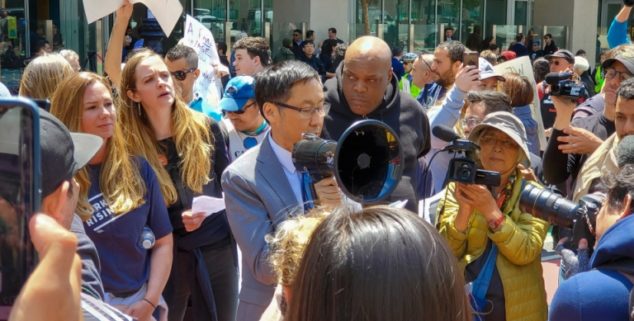Opinion
AB 5: Small solution, big problems
 Demonstrators outside the Uber offices in San Francisco. (Photo: Lucius Rueedi, via Shutterstock)
Demonstrators outside the Uber offices in San Francisco. (Photo: Lucius Rueedi, via Shutterstock)Assembly Bill 5 has been signed; now the battle begins. The bill compels some businesses, and labor platforms like Uber, Lyft, Doordash, TaskRabbit or GrubHub to classify their on-demand workers as employees with labor law protections.
Honking drivers circled the capital as AB5 was debated. Uber’s chief legal officer has already said they won’t comply. A $90m war chest is being readied for a ballot initiative promoting weaker protections.
In the war over AB5, gig work companies will point out – rightly – millions of Californians need sporadic hours of work to fit around other commitments.
But, even if AB5 endures, it only addresses one part of today’s precarious labor market. 41% of hourly employees don’t know next week’s hours or pay, despite filing a W2 tax form. Meanwhile California’s off-the-books shadow economy, made up largely of ad-hoc work, costs the state $8.5 billion annually in lost tax revenue.
These diverse irregular workers need more than basic protections and minimum wage. How about; Progression to better paying skills? Minimal unpaid downtime when they want to work? Management by a human rather than unaccountable algorithms? Pathways to stability? Although we must remember about 20% of our workforce can only work sporadically, around fluctuating medical issues, caregiving or parenting needs.
In the war over AB5, gig work companies will point out – rightly – millions of Californians need sporadic hours of work to fit around other commitments. Millions more want to know the option is there as a safety net.
But could other, less abrasive, large-scale enablers of this work emerge? Could that be done in a way that goes beyond AB5’s limited goals? And might it perhaps deflate corporate antagonism around AB5? We believe so. The key is a network currently on the margins of our new era of fragmented work.
Funded by four national philanthropies, we work closely with the British team.
California has a State Workforce Board and a web of Local Boards. We provide publicly funded training, recruitment, support and other services maximizing economic growth and individual opportunity. However, target outputs for our federal funding keep us focused on traditional job creation. That could now be failing our communities.
Our state board already provides an online platform matching any job-seeker to any employer, ”CalJobs”. At Pacific Gateway, the board for City of Long Beach we decided to step outside normal boundaries to launch an equivalent for the more demanding hourly labor market.
Called a CEDAH (Central Database of Available Hours), this new labor market emerged from programs initiated by Britain’s Labour government. It allows anyone to offer hours of their choice; today, tomorrow or weeks ahead. They can work seamlessly, on their own terms, in any type of work they like if they have the necessary certification. Progression is data driven and personalized.
At the heart of the platform are intermediaries who vet, payroll and become employer-of-record in return for a mark-up built into each transaction. Ongoing relationships between work-seekers and businesses are fostered and turning a gig worker into a full-time employee is a target outcome. Precise interventions can be triggered to support someone who is struggling.
Funded by four national philanthropies, we work closely with the British team. Our program won the US Conference of Mayors’ award for best economic/job development initiative in America.
This isn’t a silver bullet for the spectrum of problems around precarious work. But it can open possibilities. Might Uber or its competitors want to focus on transportation rather than the increasingly fraught business of operating an hourly labor market? Driving for them could become one more option for formally employed flexible workers in the wide markets a CEDAH can enable.
This sort of innovation is always three-steps-forward-two-steps-back. “Gig work” can be a third-rail political issue and AB5 is likely going to make that worse. But, as the fog of war descends over AB5 and fills the headlines, please don’t assume it was ever going to end the problems of people who don’t work regular hours.
—
Editor’s Note: Nick Schultz is the executive director of Pacific Gateway, the public workforce board serving Long Beach and surrounding areas. Wingham Rowan runs Beyond Jobs, the British non-profit that emerged from government programs to support irregular workers.
Want to see more stories like this? Sign up for The Roundup, the free daily newsletter about California politics from the editors of Capitol Weekly. Stay up to date on the news you need to know.
Sign up below, then look for a confirmation email in your inbox.

Leave a Reply